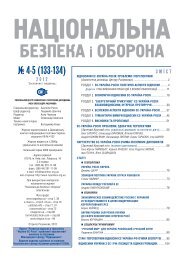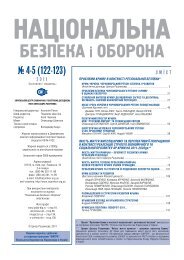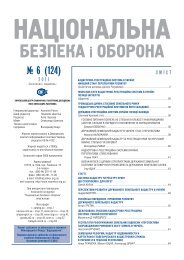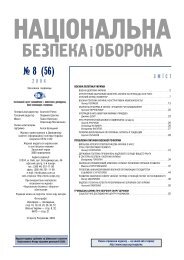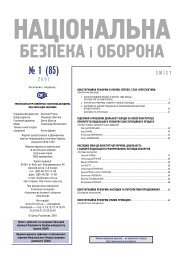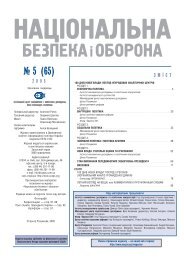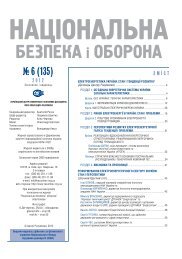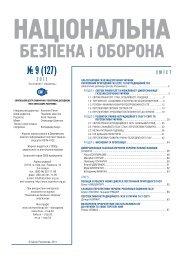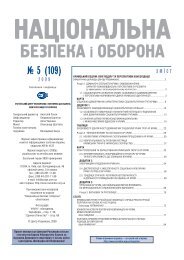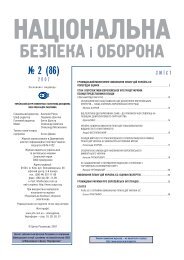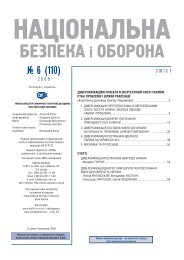RUSSIA THE EURASIAN CUSTOMS UNION AND THE EU COOPERATION STAGNATION OR RIVALRY?
RUSSIA, THE EURASIAN CUSTOMS UNION AND THE EU ...
RUSSIA, THE EURASIAN CUSTOMS UNION AND THE EU ...
- No tags were found...
Create successful ePaper yourself
Turn your PDF publications into a flip-book with our unique Google optimized e-Paper software.
PUBLIC OPINION<br />
Representatives of the eldest age group were<br />
less inclined to see the advantages of joining the <strong>EU</strong><br />
(as compared with the other age groups). 4<br />
Residents of the South and the East (less – of the<br />
West) were more prone to name the advantages of the<br />
Customs Union. “Common history” and “presence of<br />
natural resources” were less frequently named among the<br />
advantages of joining the Customs Union by representatives<br />
of youth (as compared with the other age groups).<br />
While comparing the <strong>EU</strong> and the Customs Union,<br />
the general public found it difficult to distinguish<br />
which one of them is “a simpler and more reliable<br />
partner”, “more prone to dictate, both politically and<br />
economically, to its members”, “offers more opportunities<br />
for promoting goods of its member countries to markets<br />
of third countries” – almost equal proportions of the<br />
respondents attributed all these features to both the <strong>EU</strong><br />
and the Customs Union (Diagram “Comparing the <strong>EU</strong><br />
and the Customs Union…?”). However, the majority<br />
believes the <strong>EU</strong> pursues a more socially oriented policy,<br />
where GDP growth leads to an increase of personal<br />
income (47% vs. 15%).<br />
All in all, 49% suggested that the European model<br />
is far more attractive than the Russian one (only 23%<br />
disagreed with that), and 43% agreed that the Customs<br />
Union’s countries have no democracy (31% disagreed)<br />
(Diagram “Do you agree with the following statements?”).<br />
The following disadvantages of the <strong>EU</strong> were<br />
mentioned more frequently: unstable economic<br />
situation (34%), uneven economic development of<br />
the <strong>EU</strong> countries (32%), domination by some leading<br />
states over other <strong>EU</strong> countries (31%), as well as<br />
differences in culture, values, mentality of citizens of<br />
the <strong>EU</strong> countries (24%), shortage of natural resources<br />
(23%), unemployment (16%) (Diagram “What are the<br />
main disadvantages of the <strong>EU</strong>?”). Regarding the current<br />
crisis in the <strong>EU</strong>, 48% of respondents noted that it would<br />
be resolved with time, and the <strong>EU</strong> citizens would avoid<br />
facing fundamental deterioration of living standards<br />
(only 20% disagreed with that) (Diagram “Do you agree<br />
with the following statements?”).<br />
Disadvantages of the <strong>EU</strong> were less evident to<br />
the residents of the West, more – to the residents of<br />
the South. Southerners more frequently noted domination<br />
by the <strong>EU</strong> leading states over other <strong>EU</strong> countries,<br />
cultural differences, unemployment, and alongside with<br />
Easterners – the unstable economic situation and shortage<br />
of natural resources. By contrast, residents in the West<br />
indicated the <strong>EU</strong>’s inefficient migration policy (which<br />
could be a sign of discontent with what the respondents<br />
see as severe obstacles to entering <strong>EU</strong> countries).<br />
Major drawbacks of the Customs Union, as<br />
people see them, include corruption (48%), grey<br />
economy (33%), Russian domination (29%), and lack<br />
of democracy (27%) (Diagram “What are the main<br />
disadvantages of the Customs Union?”).<br />
Disadvantages of the Customs Union are more<br />
evident to the residents of the West, who mention<br />
corruption, lack of democracy, Russian domination<br />
(although these factors are quite often reported in other<br />
regions, too). The spread of grey economy is equally often<br />
reported by residents of the West, Centre and East; less<br />
often – by residents of the South. Representatives of the<br />
eldest age group and people with low level of education<br />
(incomplete secondary) hardly ever mentioned the<br />
disadvantages of the Customs Union.<br />
Representatives of some social and professional<br />
groups assess disadvantages of the Customs Union from<br />
the viewpoint of their professional interests. For instance,<br />
businessmen referred to corruption (61%, and 48%<br />
of all the respondents polled) and unfriendly business<br />
environment (19% and 7%, respectively).<br />
By and large, when comparing the <strong>EU</strong> and the<br />
Customs Union, the <strong>EU</strong>’s prospects for development<br />
(38%) prevailed over those of the Customs Union<br />
(31%), although many respondents spoke of uncertain<br />
future for both unions (36% and 35%, respectively)<br />
(Diagram “How would you assess the prospects for<br />
further development of…?”).<br />
Positive attitudes towards the <strong>EU</strong>’s prospects prevail<br />
in the West, among the Ukrainian-speaking population,<br />
and rise markedly among younger respondents and<br />
those with higher education.<br />
Prospects for the Customs Union are more positively<br />
assessed in the South and the East, and among the<br />
Russian-speaking population. Interestingly, more favourable<br />
attitudes rise with age and fall with better education levels.<br />
Assessments of the “humanitarian potential” or<br />
“human capital” of the <strong>EU</strong> and the Customs Union are<br />
controversial. Here, in many respects, the respondents’<br />
perceptions of the <strong>EU</strong> are more positive: for instance,<br />
they believe that in the <strong>EU</strong> people are more cultured (48%)<br />
than in countries of the Customs Union; have a stronger<br />
sense of dignity (42%); more socially active and caring<br />
(42%). Instead, they note that people in the Customs Union<br />
and Ukraine are more alike mentally (64%). However,<br />
judging by the logic of those polled, this mental kinship<br />
also has some negative connotations such as relatively low<br />
level of culture, social passivity, lack of personal dignity<br />
(Diagram “Comparing the <strong>EU</strong> and the Customs Union<br />
countries, where do you think the people are…”?).<br />
Explaining attitudes to Ukraine’s accession<br />
to the <strong>EU</strong> or the Customs Union 5<br />
Proponents of <strong>EU</strong> membership tend to name<br />
economic reasons to explain their position: “life will<br />
get better, living standards will increase, we will secure<br />
a better life for our children and grandchildren” (21% of <strong>EU</strong><br />
supporters), “living standards in the <strong>EU</strong> are higher than<br />
in Ukraine” (21%), “since Europe is technologically and<br />
socially more developed than Ukraine, accession to the <strong>EU</strong><br />
will speed up Ukraine’s development”, “give an impetus to<br />
Ukraine’s development” (11%), “it will promote economic<br />
reforms, economic and industrial development,” (10%).<br />
Meanwhile, more than 5% of <strong>EU</strong> supporters also mentioned<br />
the following reasons: “this will give Ukrainian citizens<br />
a possibility of visa-free travel across the <strong>EU</strong> countries”<br />
(8%), “the European social model is more attractive” (7%),<br />
“this will reduce unemployment” (6%) (Diagram: “Why do<br />
you think we should join the <strong>EU</strong>…?”). Hence, on top of<br />
economic reasons, supporters of European integration<br />
also spoke of social prospects and social changes that<br />
should take place in Ukraine after its accession to<br />
the <strong>EU</strong>, as well as simplification of travel to the <strong>EU</strong><br />
countries for Ukrainian citizens.<br />
Opponents of accession to the <strong>EU</strong> explained their<br />
position as follows: “we are not wanted in the <strong>EU</strong>” (19%<br />
of those opposing the <strong>EU</strong> membership), “our people are<br />
not prepared and not ready to live in the <strong>EU</strong>” (14%),<br />
4 Hereinafter – 60 years and more.<br />
5<br />
Questions about motives were open-ended, i.e., respondents were not given a list of possible answers to choose from, but formulated answers on<br />
their own. Their answers were codified and summarised.<br />
RAZUMKOV CENTRE • NATIONAL SECURITY & DEFENCE • №4-5, 2013 • 105



